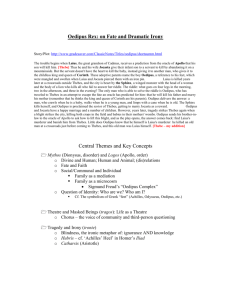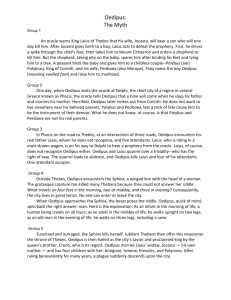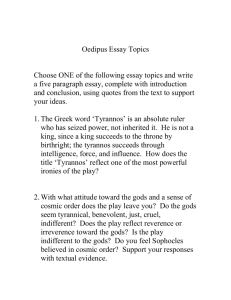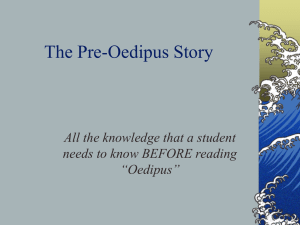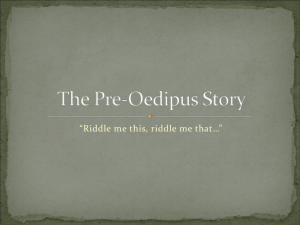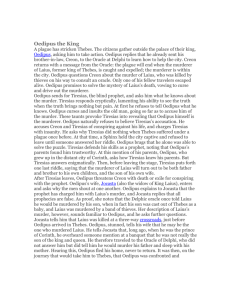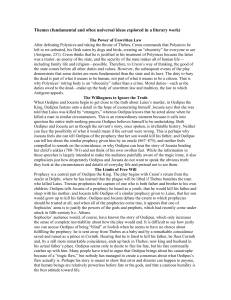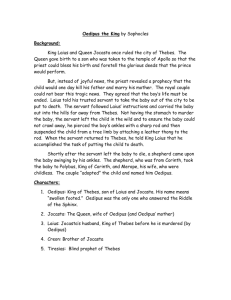The Role of Jocasta in Oedipus the King
advertisement
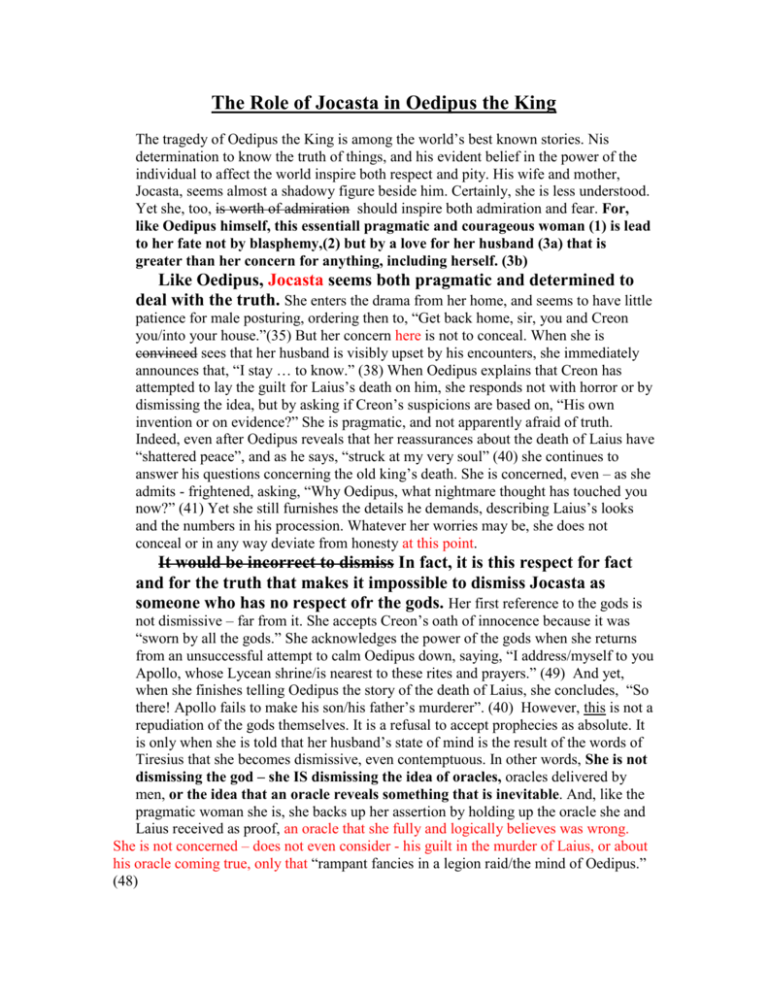
The Role of Jocasta in Oedipus the King The tragedy of Oedipus the King is among the world’s best known stories. Nis determination to know the truth of things, and his evident belief in the power of the individual to affect the world inspire both respect and pity. His wife and mother, Jocasta, seems almost a shadowy figure beside him. Certainly, she is less understood. Yet she, too, is worth of admiration should inspire both admiration and fear. For, like Oedipus himself, this essentiall pragmatic and courageous woman (1) is lead to her fate not by blasphemy,(2) but by a love for her husband (3a) that is greater than her concern for anything, including herself. (3b) Like Oedipus, Jocasta seems both pragmatic and determined to deal with the truth. She enters the drama from her home, and seems to have little patience for male posturing, ordering then to, “Get back home, sir, you and Creon you/into your house.”(35) But her concern here is not to conceal. When she is convinced sees that her husband is visibly upset by his encounters, she immediately announces that, “I stay … to know.” (38) When Oedipus explains that Creon has attempted to lay the guilt for Laius’s death on him, she responds not with horror or by dismissing the idea, but by asking if Creon’s suspicions are based on, “His own invention or on evidence?” She is pragmatic, and not apparently afraid of truth. Indeed, even after Oedipus reveals that her reassurances about the death of Laius have “shattered peace”, and as he says, “struck at my very soul” (40) she continues to answer his questions concerning the old king’s death. She is concerned, even – as she admits - frightened, asking, “Why Oedipus, what nightmare thought has touched you now?” (41) Yet she still furnishes the details he demands, describing Laius’s looks and the numbers in his procession. Whatever her worries may be, she does not conceal or in any way deviate from honesty at this point. It would be incorrect to dismiss In fact, it is this respect for fact and for the truth that makes it impossible to dismiss Jocasta as someone who has no respect ofr the gods. Her first reference to the gods is not dismissive – far from it. She accepts Creon’s oath of innocence because it was “sworn by all the gods.” She acknowledges the power of the gods when she returns from an unsuccessful attempt to calm Oedipus down, saying, “I address/myself to you Apollo, whose Lycean shrine/is nearest to these rites and prayers.” (49) And yet, when she finishes telling Oedipus the story of the death of Laius, she concludes, “So there! Apollo fails to make his son/his father’s murderer”. (40) However, this is not a repudiation of the gods themselves. It is a refusal to accept prophecies as absolute. It is only when she is told that her husband’s state of mind is the result of the words of Tiresius that she becomes dismissive, even contemptuous. In other words, She is not dismissing the god – she IS dismissing the idea of oracles, oracles delivered by men, or the idea that an oracle reveals something that is inevitable. And, like the pragmatic woman she is, she backs up her assertion by holding up the oracle she and Laius received as proof, an oracle that she fully and logically believes was wrong. She is not concerned – does not even consider - his guilt in the murder of Laius, or about his oracle coming true, only that “rampant fancies in a legion raid/the mind of Oedipus.” (48) Of greater importance to her, however, than fact and the truth of prophecy Living as she does in an age that accepts the idea of fate, this insistence on fact and the dismissal of oracles might still seem arrogant, but it quickly becomes clear that Jocasta’s main concern is the happiness of her husband. We need to remember that the main concern of Oedipus is the fact that he might turn out to be the murderer of Laius, and therefore, the cause of the city’s agony. She, however, correctly perceives that part of his uncertainty lies in his fear of the oracle that sent him fleeing from Corinth. In her response to his assertion that “the verdict tilts to heavily to me” (46), she attempts to answer both his fears: Rest assured; his account was that, exactly that, He cannot cancel what he said. The whole town heard, not I alone. And even if he tries to change a word, he still can never make – oh surely, King!the death of Laius tally with the oracle, which said it had to happen through a son of mine … poor nbabe, who never killed a thing but himself was killed – oh long before! After this, I’ll never change my look from left to right to suit a prophecy. The first part of her response is obviously aimed at calming Oedipus’ fears that he might have killed Laius. But the second part is just as obviously aimed at calming and even repudiating the concern that has dominated his life in the years leading up to this day, a concern that neither sees as having any effect of the here and now sufferings of Thebes. When he persists in his fears, she says, “But let us go indoors./All my care is you, and all my pleasure yours.” Again, her intention is to calm him, soothe him, herhaps even seduce him away from his worries. She is clearly a loyal wife, in love with and concerned for her husband and his peace of mind. Her seemingly blasphemous assertion, “How dwindled are the grand predictions of Apollo.”, (51) and her almost exultant reaction to the news of the death of Polybus - “This is the man that Oedipus was terrified to kill, so fled;/And now, without the slightest push from him, he’s dead.” P.50 – have nothing to do with the tribulations of Thebes. They refer only to the Corinthian oracle that she now realizes drove her husband away from parents and a city that he loved. Jocasta’s concern for Oedipus is all consuming, greater not only than her concern for Thebes, but even greater than her concern for herself. The former is already obvious. The latter becomes clear when the messenger continues his happy story, revealing to Oedipus the truth of his birth. Jocasta’s response is silent. She goes pale, she covers her face, and she stands, transfixed, now aware that she has fathered children by her husband/son, and now fully aware that the oracles – both of them - are true. She cannot change this. She is guilty of the greatest of sins. Yet she does not rush to kill herself . Instead, she turns to her husband, crying at him to “Forget it all. It’s not worth knowing.” (58) When he persists, so does she: “I’m pleading for what’s best for you.” (59) And when it becomes clear that he will not listen and that he will persist in his search for the truth, her response is almost a prayer: “God help you, Oedipus! Hide it from you who you are.” Her concern again is not for herself. It is all for him. She does not attack oracles anymore. She does not answer questions or react pragmatically. She only urges him to stop the search, thereby trying to spare him the horror that she faces. Shattered in her own soul, her concern is only for his. It is only when she realizes that she cannot stop him that she turns away and rushes to her own death. Jocasta is no simple lover of power, no blasphemer, and no plotter. She is – first and foremost – a woman to whom love is all. Oedipus falls on a far grander scale, suffering because he attempted to stop the sufferings of an entire city, because he dared to place humankind at a level nearly equal to that of gods. Jocasta falls more domestically, placing the heart above the mind and her husband before herself. His disgrace in the city streets appalls us. But we will not be rulers. Her death – upon the marriage bed – is closer to our own lives, and should move us even more.
